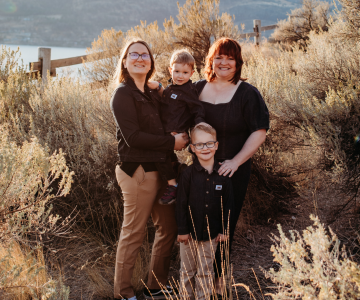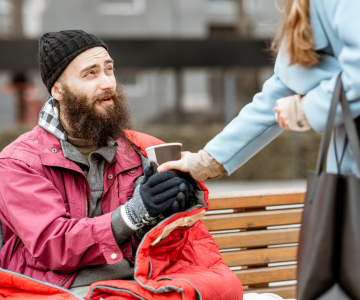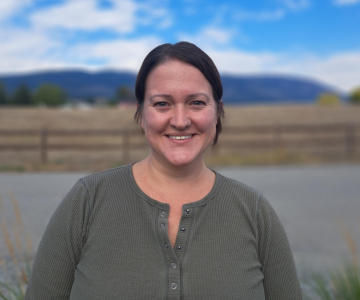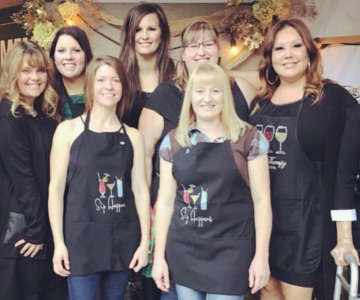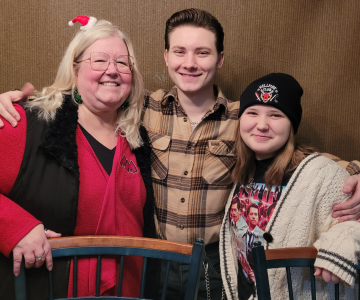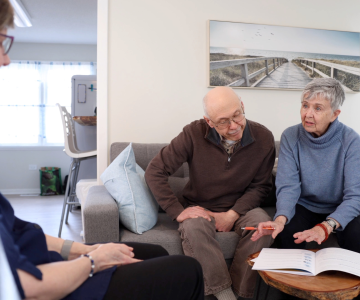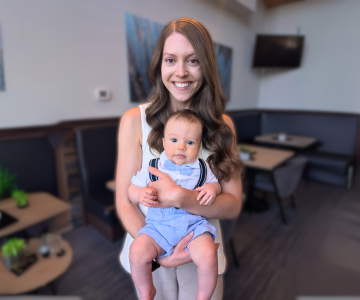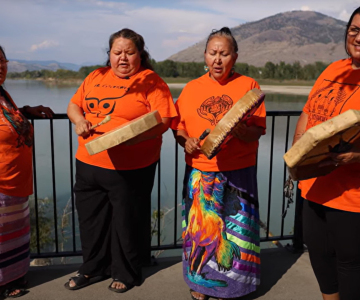Breadcrumb
Explore Stories
Community & Culture
Name: Emily Davidson (she/her/hers)Job Title: Licensed Practical NurseLength of Service: 9Worksite: Kelowna General Hospital Community: KelownaAncestral Territory: syilx
For nearly a decade, Emily Davidson has called the syilx ancestral territory—also known as Kelowna—home. She acknowledges the importance of living and working on this land with humility and respect.
“To me, reconciliation means acknowledging atrocities done to the First Nations Peoples,” she says. “It means checking my own bias when assessing a patient or speaking with their families. It’s about choosing to actively be a part in deconstructing colonialist ideals and becoming humbled by learning about ancestral knowledge, languages and practices. We have so far to go, and so much to learn.”
For the past six years, Emily has been caring for patients as a Licensed Practical Nurse (LPN) at Kelowna General Hospital, where she remains a steady presence on Ward 3 East.
"I have been on the same ward for six years and have no plans to leave,” she says. "Consistency and routine help me focus on giving the best care I can, even with the variables in health care."
Community & Culture
This is part one in a series exploring the connection between housing and health in the Interior Health region.
In Canada, access to safe, affordable housing is one of the strongest predictors of health. Research shows people without stable housing face additional health impacts and more barriers to care.
Although housing is both a basic need and a human right under international human rights law, many people - including people living in the Interior Health region - are without homes.
“Having a home is a basis for everything. Without it, it’s impossible to do anything … all you can do is survive,” says Shane, a resident at a Vernon supportive housing facility featured in a BC Housing video. “The public considers us dirty and bad. And like, everybody’s a criminal, and that’s not the case."
Community & Culture
Name: Sahra Gibb (she/her/hers)Job Title: Team Lead, Internal RecruitmentLength of Service: 12Worksite: Community Health and Services Centre Community: KelownaAncestral Territory: syilxFavourite Quote / Advice to Live By: “Nature has always been a part of my identity. Growing up on a farm instilled a love of all things that grow, and camping and hiking with my family meant that the beautiful bush around the Okanagan is a place of peace, connection and joy. While my job is inside at a desk, I spend as much time as I can in my flower garden, camping on weekends, and hiking in nature with friends.”
Sahra Gibb says that while a career in health care was “not originally on my radar as a student,” she quickly recognized she could utilize her training in human resources (HR) in the health-care sector to make a difference in people’s lives.
“I pursued a career in human resources as I felt strongly about helping people thrive in their workplaces,” explains Sahra, who’s been with Interior Health (IH) for 12 years. “Health care came on my radar as many of my childhood friends entered the industry and I recognized the massive contribution they were making to our communities.”
Sahra joined IH just two months after graduating from Okanagan College in 2013, working her way up from HR assistant in the benefits department to her current role as a team lead in Internal Recruitment.
Health & Wellness
As the toxic drug emergency continues, drug checking is one way to reduce the risk of using unregulated drugs. Drug checking provides the most accurate information about what is in drugs, so people who use drugs can make informed choices about where, when and how much to use.
The service is fast, free, confidential, and is legal at approved sites. Samples can be as small as a grain of rice and results are typically available within 10 minutes.
The staff who provide the service are non-judgmental and, no matter the results, we don’t confiscate drugs, and they can be returned to you.
Whatever reason you choose to use drugs; we want you to bring in or drop off a sample for testing before you use.
Community & Culture
Foundations in the Interior region raise funds that support medical equipment, care needs, and innovative local initiatives in their communities. Each organization includes respected community leaders, volunteers and staff who are passionate about meeting the needs of patients and families in Interior Health. Thanks to the generosity of their supporters, we all have a stronger health system.
In this next story of our series on the incredible health-care and hospital foundations throughout our region, we interviewed Jessica McLellan, chair of Lillooet District Hospital Foundation.
Community & Culture
Name: Sharon Kriger (she/her/hers)Job Title: Labour relations specialistLength of Service: 6 yearsWorksite: Kelowna Community Health & Services CentreCommunity: North OkanaganAncestral Territory: syilxFavourite Quote / Advice to Live By: "There are three sides to every story: my side, your side and the truth and no one is lying. Memories shared serve each one differently." - Robert Evans
Sharon Kriger is a labour relations specialist with Interior Health (IH) who is inspired by the people around her, and is a proud auntie of two thirds of the Dixie Fried Hep Katz Canadian rockabilly band: an energetic rockabilly trio based in the Okanagan valley in B.C. Canada.
Realizing that she wanted to work with people, Sharon obtained an education in human resources (HR). She worked various contract positions across many provinces and industries to get a breadth of experience and help her be great at her job. One of her proudest career accomplishments was working a one-year contract with STARS (Shock, Trauma, Air Rescue Society) out of Alberta.
Health & Wellness
Many of us embrace our 50s and 60s and beyond as an opportunity for adventure and discovery. Sooner or later, however—as much as we might not want to admit it—most of us will face age-related challenges.
None of us knows what the future holds, but we can plan for it. There are tools and ways we can plan for the unexpected, whether it’s a medical emergency or slower decline.
Even if you’re feeling well and healthy now, it’s a good idea to be prepared in case you become suddenly unwell and not able to make decisions for yourself.
Here’s a step-by-step guide to planning for your health and well-being:
Health & Wellness
Like many expectant moms, Emily Canzian attended prenatal classes and did a lot of preparing for her son Luca’s birth.
But even with classes and education, it was still a shock to Emily how difficult breastfeeding proved to be in the first three days after birth.
“You're not really prepared for how tough it's going to be,” says the Kelowna dietitian. “In the classes they touch on topics like the time it takes for milk to come in, and the several weeks it can take to establish breastfeeding and milk supply.
“The struggles and the changes in my own body as it prepared to produce milk were intense for me.”
Community & Culture
Content warning: This article references Indian residential schools (IRS) and may affect those who attended a school or know someone impacted by it.
Each year, September 30 marks Orange Shirt Day and the National Day for Truth and Reconciliation.
Orange Shirt Day is an Indigenous-led grassroots commemorative day intended to raise awareness of the individual, family and community intergenerational impacts of residential schools, and to promote the concept of “Every Child Matters.” This date was chosen because it is the time of year in which Indigenous children were taken from their homes to residential schools.
National Day for Truth and Reconciliation honours the children who never returned home from and Survivors of residential schools, their families and communities. This federal statutory holiday was created through legislative amendments made by Parliament in 2021. Public commemoration of the tragic and painful history and ongoing impacts of residential schools is a vital component of the reconciliation process.
-
Load More
Showing 36 of 813
Sign up for email updates
Receive news, alerts, public service announcements and articles right to your inbox.


